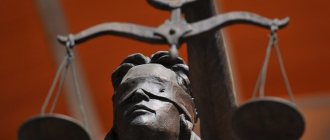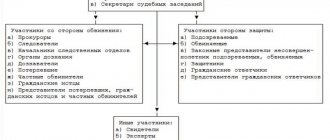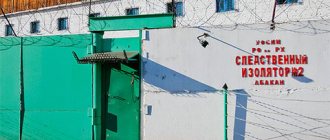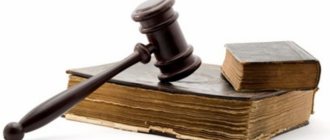The concept of participants in criminal proceedings and their classification
Participants in the criminal process, designed to determine the degree of guilt of the subject, are all individuals and officials involved in it and endowed with rights, as well as responsibilities that manifest themselves within the framework of the meeting.
The classification of subjects of criminal proceedings is based on procedural functions. Thus, the following groups of subjects of criminal proceedings can be distinguished: prosecution, defense and court.
Despite this, when classifying subjects, four self-sufficient types of participants in the process are distinguished:
- The judiciary is an independent and impartial body that does not take into account any interests other than the rule of law. The instance acts as the process itself. In this regard, quite often the court is not considered as a subject of criminal proceedings;
- accusation. This group is represented by a large number of officials serving in the search, investigation and inquiry agencies. This group also includes individuals and legal entities that are the injured party;
- protection. The main subject of the criminal process on the part of the defense is the lawyer of the suspect, accused or defendant. Of course, there may be several of them. Without the presence of this group of subjects, the procedure itself does not have the signs of a fair, independent and impartial court;
- other subjects. For the most part, these are persons who can influence the assessment of evidence and characterize the personality of the defendant. Most often these are experts in different fields.
Subjects of criminal proceedings, regardless of belonging to one of the groups, have their own procedural powers that allow them to be identified. In simple words, the rights and obligations of a participant in the process are a classification feature that allows the subject to be included in one or another group.
Equal rights of defense and prosecution
The Constitution of the Russian Federation guarantees the implementation of legal proceedings on the basis of adversarialism and equality of the parties, which, together with the constitutional guarantee of receiving qualified legal assistance, should establish in criminal proceedings equal rights of defense and prosecution to collect and present evidence (Articles 48 and 123).
In criminal proceedings, a lawyer defends a suspect or accused, as well as represents a victim, civil plaintiff or civil defendant. Lawyers providing defense and representation in criminal cases often need to present as evidence information that constitutes state secrets and/or information that has limited access. The list of information constituting a state secret is established by the Law of the Russian Federation of July 21, 1993 “On State Secrets”.
Information, for example, related to notarial, medical, banking secrecy; with personal data, about connections between subscribers and/or subscriber devices, and others are confidential information, access to which is limited by industry laws.
During the investigation, the investigator has the right to obtain some information only on the basis of a court decision, and other information on the basis of a decision issued by him. At the same time, the information obtained by the investigator without the permission of the court may relate to information to which access is limited. This provision violates constitutional guarantees for the protection of personal dignity, the right to freedom and personal integrity, the right to privacy, personal and family secrets, and others (Articles 20, 21, 23, 24 of the Constitution of the Russian Federation).
So, the norm of Art. 186.1 of the Code of Criminal Procedure of the Russian Federation gives the investigator the right to apply to the court to obtain information about connections between subscribers and/or subscriber devices. The investigator's receipt of a court order to request this information is of a formal nature.
A court decision is not required for an investigator to seize a citizen’s medical documents or documents related to notarial secrecy or others.
The procedure for obtaining information that constitutes a state secret or has limited access is not established by law for a lawyer defending a suspect (accused) or representing a victim, civil plaintiff or civil defendant. This situation in the inequality of procedural rights of the prosecution and defense parties violates the constitutional guarantees for adversarial and equal proceedings, for receiving qualified legal assistance, as well as constitutional guarantees for the protection of personal dignity, the right to privacy, personal and family secrets and others.
In 1996, the Constitutional Court of the Russian Federation, in Resolution No. 8-P of March 27, in the case of verifying the constitutionality of Art. 1 and 21 of the Law of the Russian Federation of July 21, 1993 “On State Secrets” recognized them as not complying with the Constitution of the Russian Federation, its Art. 48 and 123, since from Art. 48 of the Constitution of the Russian Federation it follows that a lawyer providing defense in criminal cases is a participant in the process. The procedure for criminal proceedings is uniform and mandatory in all criminal cases and for all courts, prosecutors, preliminary investigations and inquiries and is determined by criminal procedural legislation and not by any other federal law.
In 2011, the Constitutional Court of the Russian Federation, in Determination No. 1063-O-O of September 29, clarified the rights of a defense lawyer to apply to the court with petitions to obtain a court order to request information about connections between subscribers and/or subscriber devices.
However, the courts refuse lawyers to consider, and even more so to satisfy, such requests on the grounds that they are illegal and that the defense lawyer does not have such a right.
Investigators also refuse this when the defense lawyer asks the investigator to petition the court to obtain a decision, on the basis of which the defense will have the opportunity to present the evidence it needs to substantiate its position in the case.
The bill, which was developed by lawyer, member of the HRC Yuri Kostanov and me, proposes to legislatively consolidate the legal positions of the Constitutional Court of the Russian Federation in its decisions of March 27, 1996 No. 8-P and of September 29, 2011 No. 1063-O-O on the right of defense to independently apply to the court for a judicial act to obtain information constituting a state secret and/or confidential information that has limited access, including information about connections between subscribers and/or subscriber devices, in order to prevent violation of the rights of the defense to provide such information evidence, as well as for the investigator and lawyer (defender or representative) to receive information about the requisition of objects and documents containing state secrets and/or confidential information only on the basis of a court decision.
Court - body of justice
The subjects of criminal proceedings, their classification and their concept are important not only from a theoretical point of view. Division into groups allows you to achieve the main thing - the implementation of fair justice. This can be proven in detail by studying the groups listed above, and first of all the court itself, which is essentially the curator of the legality of the application of rights.
The Code of Criminal Procedure of the Russian Federation clearly spells out the issues related to the organization of the trial process and the actions of judges. If the latter go beyond the law, then their decision can be appealed and canceled. Thus, despite its self-sufficiency, the court is still subject to the norms and rules established by the legislator.
Russian courts have a clear hierarchy. Thanks to this, the judiciary not only makes sentences, but also monitors their correctness. We are talking about supervision and cassation. If the rights of a participant in criminal proceedings have been violated, he has the right to appeal to the head of a higher authority, who will make a decision on this issue.
The judicial power of the Russian Federation has equal power with the legislative and executive, but the procedure for its formation has significant differences. Law enforcement practice, present in the work of judges, determines a special set of criteria for selecting candidates for the judiciary. This may include both age and experience in the field of law.
The special selection criteria are determined not least by the fact that the court, considering cases of various compositions, must be able to competently apply the law, correlating it with the materials and factual circumstances. Thus, in order to obtain a position as a judge, a person is required to pass an exam, which is preceded by practical training as a secretary or assistant judge.
Concept and classification of participants in criminal proceedings in court
Legislators and the state as a whole are interested in ensuring that justice is administered fairly and honestly. In this regard, conditions of increased comfort have been created for employees of the judicial system. The main subject of the criminal process is divided by jurisdiction into a number of categories. Currently there are 5 of them. Each category has its own procedural framework.
The competence of the court is delimited. This is due to the fact that it is assumed that representative offices will be divided into certain territorial zones and structural units, for example, when it comes to considering cases in which employees of the RF Armed Forces are accused. The division is also made into certain areas that serve population groups ranging from 15 to 30 thousand people. Such a division helps reduce the burden on judges and provides an opportunity for every person to realize the right to justice.
Another guarantee of the impartiality of the court is the provision that states that a criminal case can be considered either by a single judge or by a certain panel. This approach gives legitimacy to the process itself and the verdict.
Citizens outside the proceedings
In addition to the persons presented above, there may also be other participants in criminal proceedings who can be appointed, but their presence may not be required. Usually these are people directly related to the case in question:
- Participants in the trial, who may be invited from each side, often appear as witnesses.
- The expert carries out actions based on his professional skills. Engaged by the court to draw up a report on the necessary materials that require professional consideration.
- Translators can also be included on the defense and prosecution sides. This category of citizens is provided if one of the parties does not speak Russian.
Important! The rights and obligations of participants in criminal proceedings must be respected regardless of the status or category of cases. The court and each of the representatives of the parties can invite only those persons who are directly indicated in the procedural documents.
All persons participating in the trial must be registered before the hearing of the case itself . The court must receive lists of persons to invite to consider all evidence and, if necessary, call them as citizens with certain statuses in court.
The average person, when faced with criminal trials in one way or another, is guided by a common vague formulation, the essence of which boils down to what the prosecutor will add. Implying at the same time that the state prosecutor, in whose role the employee of the prosecutor’s office acts, aims to imprison a suspect in committing a crime, like the Count of Monte Cristo, somewhere in a distant colony, closer to polar bears, until the end of time. And although, as people say, there is no smoke without fire, we decided to give the floor to Assistant City Prosecutor Postnikova in order to find out for sure all the intricacies of the complex work of the prosecutor.
— If we look at the process in a simplified way, it looks like this. In the dock is the accused. At the big table are the judges. If the process is open, everyone who wants to attend sits in the hall. There are two more polar forces: the prosecution represented by the prosecutor and the defense represented by the lawyer. There is a dispute between us regarding the guilt of the one who is now in the dock. The prosecutor builds his line of evidence, the defense builds theirs. The judges, forgive the tautology, must judge us and make the only correct decision, in their opinion. Everything seems to be extremely simple and clear. But in reality... A lot really depends on the state prosecutor. He is a kind of engine of the criminal process. Even higher authorities (and this is no secret to anyone!), if they happen to study a case, first of all look at whether the state prosecutor guided the court correctly or incorrectly.
Although, to be honest, the prosecution has a more difficult time than the defense, and here’s why. The lawyer begins to work with the arrested person almost from the moment of his arrest. The prosecutor supporting the prosecution essentially takes up the baton from the security forces who detained the criminal and the investigator who led the case. Behind us is the hardest, months-long work of a large number of people, the results of which directly depend on how the state prosecutor presents the case in court. There we act strictly according to the law and inner conviction. For those who see in the prosecutor only the “enemy of all living things,” who strives with all his might to ensure that the convicted person receives as long a sentence as possible, I want to say that in addition to the right to support the prosecution, we have the right to refuse the prosecution. And we use it because we have never been and never will be thoughtless continuers of what the investigative authorities do. We need to prove that the crime was committed by a specific person, thereby defending the interests of the victims and restoring social justice. Or drop the accusation if sufficient evidence has not been collected. Since the trials are mostly open, they are attended by citizens who judge the prosecutor’s office as a whole based on the work of the state prosecutor. Everything comes into account here - from appearance to speaking ability and erudition. And also - the ability to explain the essence of the case so clearly that the prosecutor’s point of view is understood and accepted not only by judges, but also by the so-called spectators, people on the street. The work of a prosecutor is difficult both physically and psychologically. The number of criminal cases is growing, the number of people supporting the prosecution remains at the same level. Therefore, almost every day, employees of the prosecutor’s office, as we say, “get involved in trials.” It happens that during the day you have to work on two processes. But you can’t come to them unprepared. It is necessary to thoroughly study the case, develop behavioral tactics, and build a line of evidence. When do we do this? Mainly in the evenings, when there is time for thoughtful work with documents on the next case. By the way, the Prosecutor General's Office requires that state prosecutors be present in absolutely all cases considered in the courts. States, meanwhile, are not increasing. So the volume of work will increase even more, mainly in the district prosecutor's offices. We are currently at a turning point. A judicial reform is coming, as a result of which the court will only have the right to conduct legal proceedings. Many functions (but not the state prosecution) are being taken away from the prosecutor's office. We are waiting for the adoption of the criminal procedure code, which will spell out in detail the provisions on the defense, state prosecution, and judicial authorities. But in general, of course, it’s difficult. For the simple reason that current legislation often lags behind the socio-economic metamorphoses occurring in society. To be honest, in the old days we knew (and this was taught in universities) that the court is always on the side of the prosecution. Not so now.
In recent years, the defense and prosecution have moved towards adversarial proceedings, which, by the way, is especially noticeable in the example of the Sovetsky District Court. That is, the defense and prosecution present their arguments, proving and convincing that they are right, and the judge, purely outwardly being an outside observer of this process, draws conclusions that will then be used as the basis for the decision made. It seems that with this approach it will be more objective.
Source: https://hron.ru/news/read/1883
Based on the book: Demidov I.F. On the issue of the categories of science of the Soviet criminal process // Questions of theory and practice of criminal proceedings. M., 1984. S. 24 - 27.:
Counteraction to the accusation by the defense, if at the same time it chooses the means and methods permitted by law, as well as other not prohibited by it, to fight for the interests of the accused (defendant), is not only legal, but also objectively natural.
Natural connections between the prosecution and the defense manifest themselves in different ways depending on the type of criminal process. In a mixed process, built on the principle of separation of powers, where pre-trial proceedings are carried out by executive authorities, whose main function is criminal prosecution, the relationship between the prosecution and the defense is built vertically and has the nature of subordination (power and subordination). In such a system of relations, the defense turns out to be “dosed” on the part of the prosecution and is essentially derivative of it.
The criminal prosecution authorities, realizing their significant superiority over the defense, constantly stray onto the path of unjustified restrictions on its already meager capabilities to resist their actions and decisions.
In its opposition to the prosecution with its broad powers and powerful resource of power, the defense does not have sufficient capabilities to influence the prosecution in order to deter attempts to use the so-called accusatory bias as the only and accentuated method of investigation.
To obtain incriminating evidence, the criminal prosecution body The requirements, instructions and requests of the investigator as a representative of state power are mandatory for execution by all institutions, enterprises, organizations, officials and citizens. The investigator's use of the results of non-procedural operational investigative activities expands the possibilities of criminal prosecution. The investigator's requests to carry out investigative and other procedural actions involving restrictions on the constitutional rights and freedoms of the accused and other persons are subject to mandatory and prompt consideration by a judge. Analysis of Part 2 of Art. 29 of the Code of Criminal Procedure of the Russian Federation shows that the resource of the judicial power is used only for the purposes of criminal prosecution and collection of incriminating evidence (exculpatory evidence, as a rule, is not hidden, but is presented to the investigator voluntarily). The selection by the investigator of a preventive measure in order to prevent the accused from the possibility of escaping from the investigation or court, continuing criminal activity, illegally opposing the proceedings in a criminal case, achieved by limiting his right to freedom and personal integrity, significantly reduces the ability of the accused to defend himself against the charge, especially in cases of prolonged isolation from society. At the same time, the law is silent about exactly what materials and evidence the judge must study in order to make a decision on the submitted petition to select a preventive measure in the form of detention. This gap was forced to be filled by the Supreme Court of the Russian Federation, which outlined an almost exhaustive list of procedural documents and other evidence to be included in the decision to initiate a petition to elect the accused (suspect) into custody as a preventive measure. He explained to the courts that, in accordance with Art. 45 of the Constitution of the Russian Federation, they cannot refuse these participants in the process, as well as their defenders, to satisfy the request to familiarize themselves with the named materials of the case.
According to the book: paragraphs 4 and 11 of the Resolution of the Plenum of the Supreme Court of the Russian Federation of March 5, 2004 No. 1 “On the application by courts of the norms of the Criminal Procedure Code of the Russian Federation.” We believe that in such cases the courts should also be guided by Part 2 of Art. 24 of the Constitution of the Russian Federation.
It should be added to the above that the actions of the investigator are not always adequate from the point of view of the need for serious interference in human rights or their immediate implementation. A significant part of the potential for state coercion in criminal cases is excessive coercion. This is how it appears, for example, in the case of a search of a home at night and in the absence of a court decision under the pretext of the urgency of this investigative action, when it could well have been carried out during the day in compliance with all human rights guarantees provided for by law. Excessive coercion includes the choice of detention as a preventive measure, when the circumstances of the case and the personality of the accused made it possible to leave him free, for example, on bail. This also includes the conduct of so-called over-tiring interrogations lasting eight hours or a little less. The use of excessive coercion may be the result of investigative errors, deliberate violation of the law, etc. Excessive coercion as a result of violation of the law, sometimes being a way of suppressing the will of the accused with the unseemly goal of achieving his specified behavior, obtaining a confession of his guilt, poses the greatest danger both to a person, his rights and freedoms, and to justice. The possibility of such coercion is inherent in the criminal procedure law itself, as a result of the lack of appropriate prohibitions in it. Thus, the Code of Criminal Procedure of the Russian Federation does not contain an answer to the question of how many times one person can be interrogated about the same thing and whether such multiple interrogations are in principle permissible.
At the end of the investigation, the investigator draws up an indictment, which not only determines the scope of the trial (Article 252 of the Code of Criminal Procedure of the Russian Federation), but, in addition, is the basis for a sentence or other court decision. If the indictment was drawn up in violation of the requirements of the Code of Criminal Procedure of the Russian Federation, which excludes the possibility for the court to pass a verdict (other court decision) on its basis, the judge returns the criminal case to the prosecutor (clause 1, part 1, article 237). An indictment issued by non-judicial authorities has become an act predetermining the court's decision of a guilty verdict. Criminal prosecution bodies have received additional opportunities to implement through the courts the programs assigned to them to “fight crime,” including with individuals accused of extraordinary socially dangerous acts.
Although a copy of the indictment is handed over to the accused, as well as to his defense attorney, if they request this (Part 2 of Article 222 of the Code of Criminal Procedure of the Russian Federation), however, neither one nor the other is given the right to file objections to this conclusion, which would state otherwise, opposite to the concept of prosecution, a vision of the problem of the defendant’s involvement in the incriminated act. At the same time, the Code of Criminal Procedure of the Russian Federation gives, in particular, the convicted, acquitted, and their defenders the right to bring a cassation appeal or submit their objections in writing (Part 1 of Article 358). The accused and his defense attorney should also have the right to file objections to the court as an alternative to the indictment (act). The most appropriate moment for hearing objections to the indictment seems to be the beginning of the judicial investigation, after the state prosecutor has presented the charges against the defendant and the presiding officer asks the defendant whether he or his defense attorney wishes to express their attitude to the merits of the charge (Article 273 of the Code of Criminal Procedure of the Russian Federation).
The investigator’s awareness of the fact that the defense can present objections to the indictment, which are subject to public disclosure at the very beginning of the judicial investigation, should objectively contribute to the fact that the investigator will be more attentive and responsible when summing up the results of the investigation and drawing up the indictment. As for the defense, it can become more organized, act according to the program (in accordance with the objections) and not be bound by the remarks and value judgments of the accuser, made impromptu and under the influence of emotions.
The court still appears to be one of the links in the system of so-called criminal justice, which also includes criminal prosecution bodies, prosecutors, and structures carrying out operational investigative activities. In this system, the ability of the court to disavow, in necessary cases, the conclusion of the investigative bodies and the prosecutor's office in a criminal case, in particular, due to the abolition of the institution of returning the case for additional investigation.
Considering this decision of the legislator to be fair, at the same time we believe it is necessary to give the court additional powers to terminate a criminal case due to violations of the constitutional rights and freedoms of the defendant, non-compliance with the preliminary investigation procedure (for example, in the case of investigative actions without the participation of a defense lawyer, when his participation is mandatory, and also when substantiating the accusation with evidence declared inadmissible by the court, etc.).
The inclusion of these and some other grounds in the list of those that entail the termination of a criminal case should help improve the quality of the preliminary investigation, respect for individual rights and freedoms in criminal proceedings, and ensure the legality of criminal proceedings. These proposals comply with the provisions of the Constitution of the Russian Federation that a person, his rights and freedoms are the highest value (Article 2), as well as the inadmissibility of using evidence obtained in violation of federal law (Part 2 of Article 50), etc. .
Having received the methodologically correct provision of the Code of Criminal Procedure of the RSFSR (Part 2 of Article 301), the Code of Criminal Procedure of the Russian Federation accordingly established that “a court verdict can be based only on the evidence that was examined at the trial” (Part 3 of Article 240), and therefore, on the evidence presented by the defense (Part 2 of Article 274). However, this rule completely contradicts the provision that the court makes a verdict on the basis of an indictment, that is, on incriminating evidence. The legislator’s desire is visible to prevent the court from being “arbitrary” in relation to the position of the security forces expressed in the indictment.
Source: https://www.lawmix.ru/comm/1797
Prosecution
When considering the subjects of criminal procedural evidence, the prosecutor should be highlighted first. The Code of Criminal Procedure does not indicate subordinate persons within the prosecutor's office. However, deputy prosecutors and the prosecutor general chosen by the Presidium have the same procedural rights.
In addition to acting as a public prosecutor, this subject is responsible for monitoring the legality of the actions of persons conducting events preceding the trial. We are talking about investigative and inquiry bodies. Thus, the prosecutor, as a subject of criminal procedural evidence, participates in the preliminary investigation and court hearing.
The Prosecutor's Office is vested with the powers of the main supervisory authority and defender of the rights and guarantees enshrined in the Constitution of the Russian Federation. A representative of this body builds an accusation against the person who has violated the law. But at the same time, he makes sure that his rights are not violated, both during the preliminary investigation and in court.
The RF Investigative Committee may also be the prosecution party. It functions in tandem with the prosecutor's office, since it is she who gives instructions to initiate criminal cases. It should be taken into account that the investigator is an independent subject.
Investigators have almost equal opportunities with the investigative committee. They have the right to work only on those cases in which the offender has already been identified. The investigation department cannot participate in preliminary search activities. At the same time, the investigator has a functional basis for organizing office work. This is required when traces of an illegal act have not been established or there is a need to secure them. Investigators report to the prosecutor's office and the investigative department. In fact, the investigation department is not independent.
As was said earlier, the described group of subjects also includes victims. Their position can be judged from the fact that they were harmed. In addition, half of the evidence base is provided by the victims. The injured party can be either an individual or a legal entity. We must not forget about such a participant in legal proceedings as the private prosecutor, who is also the victim.
Characteristics of subjects of criminal proceedings
- Court.
As the bearer of judicial power in criminal proceedings, he is endowed with three types of powers:
- resolution of criminal cases;
limiting the constitutional rights of people;
- control over the legality of the actions of the inquiry body, the inquiry officer, the investigator and the prosecutor.
- Prosecutor.
He is engaged in criminal prosecution and supervision of the implementation of laws by the bodies of inquiry and preparatory investigation. In relation to them, he has administrative powers. But in the trial he loses them and takes part as the prosecution.
- Investigator.
He conducts a preliminary investigation of the case, during which he must uncover the crime, expose the perpetrators, and also take measures to ensure compensation for losses caused by the offense. For this purpose, he is vested with extremely broad powers (to summon a person for questioning, conduct a search, detain persons suspected of a crime, and others).
- Head of the investigation department.
He supervises the implementation of laws by the bodies of inquiry and preliminary investigation. As a rule, he himself does not carry out any procedural actions.
- Inquiry bodies.
These include the police, commanders of military units, the FSB, customs and tax authorities. In the investigation of criminal cases, they take operational-search measures in order to detect and suppress crime.
an abstract on this topic
Statehood of Russia.
in more detail, justice is carried out exclusively by courts established in accordance with the Constitution of the Russian Federation. On this topic, we have already completed the abstract
Constitution of the Russian Federation in more detail and by the Federal Law. On this topic, we have already completed
the abstract
Regulatory legal acts of the Russian Federation in more detail. During the trial, the judge occupies a central position, and all participants in the process carry out their actions with the permission of the court and under its control.
Finished works on a similar topic
Course work Subjects of criminal procedural law 430 ₽ Abstract Subjects of criminal procedural law 280 ₽ Test work Subjects of criminal procedural law 190 ₽
Receive completed work or specialist advice on your educational project Find out the cost
Defense side
System of principles of legal proceedings and criminal procedure
Speaking about this group of subjects of criminal proceedings, first you need to pay attention to the fact that the suspect, accused and defendant have different procedural status. This affects the list of powers. A person under suspicion is an individual against whom there are indications that a crime has been committed. The accused person has a different procedural status. Certain evidence has already been collected regarding him, which, in principle, does not always indicate his guilt. In a number of cases, an indictment is issued against such an entity.
The person's status must have documentary evidence. This is not least due to the set of rights. For example, the accused has the right:
- defend yourself by any lawful means;
- submit a petition;
- receive rehabilitation measures.
The next person on the defense team is the lawyer. You need to understand that this subject gets access to criminal procedural cases only after passing accreditation for knowledge of the basics of this branch of legislation. There is an exception to this rule. A close relative may take over the defense of the accused.








